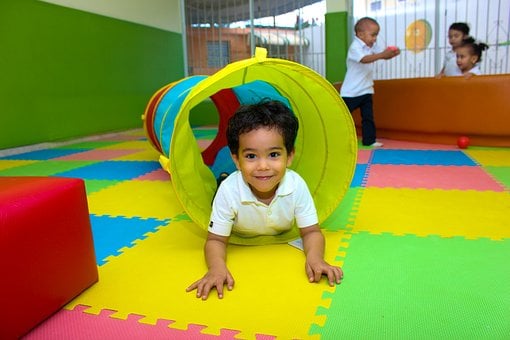The Power of Play

The Power of Play: Unleashing Learning Potential in Early Childhood Education
In the realm of #early-childhood-education, play-based learning has emerged as a powerful and effective approach to fostering children's #development. This method recognizes that young children are natural explorers, driven by curiosity and imagination. By harnessing the innate power of play, #educators can create rich learning environments that support holistic #growth-and lay the foundation for lifelong learning.
Understanding Play-Based Learning
- Play-based learning is an educational approach that capitalizes on children's natural inclination to play. It involves creating environments and experiences where children can actively engage with materials, ideas, and others in ways that feel like play to them. This approach stands in contrast to more structured, #teacher-directed methods, allowing children to take the #lead in their learning journey.
- In a play-based learning environment, children might build towers with blocks, create stories with puppets, or #explore-nature in an outdoor space. Through these activities, they're not just having fun – they're developing critical skills and knowledge across multiple domains.
Key Benefits of Play-Based Learning
- Cognitive Development: Play engages children's minds in powerful ways. As they construct with blocks, they're learning about spatial relationships and basic physics. When they engage in #pretend-play, they're developing abstract thinking and problem-solving skills. Play challenges children to think creatively, make decisions, and develop strategies.
- Social-Emotional Growth: Collaborative play provides rich opportunities for social-emotional development. Children learn to share, negotiate, take turns, and understand others' perspectives. They practice #empathy as they take on different roles in imaginative play. These experiences help build emotional intelligence and social skills crucial for future success.
- Language and Communication: Play scenarios encourage children to communicate with each other and adults. They expand their vocabulary as they describe their actions and ideas, ask questions, and engage in conversations. Storytelling and role-playing activities particularly support #language-development.
- Physical Development: Active play is essential for physical development. Whether it's climbing, running, or manipulating small objects, play helps children develop both gross and fine motor skills. These physical activities also promote body awareness and spatial understanding.
- Motivation and Engagement: When learning feels like play, children are naturally more motivated and engaged. They're more likely to persist through challenges and take risks in their learning. This intrinsic motivation can foster a lifelong love of learning.
Implementing Play-Based Learning
Educators play a crucial role in facilitating play-based learning. Rather than directly instructing children, they act as guides and facilitators. This involves:
- Creating rich, stimulating environments that spark curiosity and provide diverse learning opportunities
- Offering open-ended materials that can be used in multiple ways
- Asking thought-provoking questions to extend children's thinking
- Observing children's play to understand their interests and #developmental needs
- Gently guiding play experiences to introduce new concepts or skills
It's important to note that play-based learning doesn't mean a #free-for-all. Skilled educators carefully plan and structure the environment and experiences to align with learning goals and #developmental-milestones.
Challenges and Considerations
- Despite its benefits, play-based learning faces some challenges in implementation. Some #parents and policymakers worry that it may not adequately prepare children for formal schooling. However, research consistently shows that children who learn through play often develop stronger academic and social skills in the long term.
Another challenge is striking the right balance between child-led play and adult guidance. Too much adult intervention can stifle creativity and independence, while too little might miss opportunities to extend learning.
As our understanding of child development grows, play-based learning continues to gain recognition as a powerful tool in #early-childhood education. By embracing the natural learning processes of young children, this approach nurtures not just academic skills, but also creativity, social-emotional competence, and a love for learning. In a world that increasingly values innovation and adaptability, play-based learning offers a strong foundation for future success.
ChildcareEd, a leading provider of online training and professional development for early childhood educators. Our mission is to empower educators with the knowledge and skills they need to nurture and inspire young minds.
Check out our courses that help you plan your classroom around play! Our play, learn grow course equips childcare professionals with the knowledge to nurture young minds. By exploring child development stages (1-5 years old), applying developmentally appropriate practices, and catering to various learning styles, participants will gain the tools to create a thriving learning environment that supports each child's milestones.
There is also The best promotion is play course and Teacher and Me playtime course. We hope you check out these courses, or any of our many others!
- Role of Play in Learning
- Play with Purpose: Supporting Children with Autism
- Viewing Guidance in a Positive Light
- Power of Art: Bldg Self-Esteem & Positive Behavior for ALL Abilities
- Mentoring Professional Etiquette in Child Care
- Power of Art: Bldg Self-Esteem & Positive Behavior for ALL Abilities ONLINE
- The Best Promotion is Play
- The Best Promotion is Play
- Beautiful Junk: Using Recycled Materials in the Classroom
- The Power of International Sign Language in Early Childhood Education
- Celebrating National Reading Month
- The Power of Play: Unleashing Potential in Early Childhood Education
- The Power of Play
- Unlocking the Power of DAP
- The Power of Play: How Play-Based Learning Shapes Development
- The power of Imagination: How to add it to your classroom
- A Path to Engaged Learning: Play!
- DAP Delight: Making Learning Joyful & Just Right for Every Child
- 🌟How Can Playtime Build Bright Minds? The Power of Learning Through Play in Early Childhood
- 🧠 What Shapes a Child’s Strength, Confidence, and Emotional Growth?
- Early Childhood Education
- ⚠️🤝 How Can I Tell the Difference Between Bullying and Normal Conflict?
- Behavior Management Techniques That Align with Developmentally Appropriate Practice
- How Continuing Education Helps Child Care Providers Advance Their Careers
- Positive Discipline Strategies for Child Care Providers
- Why Is Play Essential for Your Child’s Development?